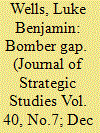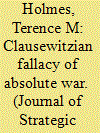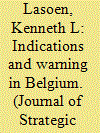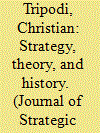| Srl | Item |
| 1 |
ID:
156671


|
|
|
|
|
| Summary/Abstract |
For most of the 1950s, manned aircraft were the prime nuclear bomb delivery method, and were therefore a vital metric for British and American intelligence when calculating the Soviet threat. Each community reached very different conclusions from the same raw intelligence, generating the ‘bomber gap’ myth in the US but not in the UK. The information available was inconclusive, so in order to understand it estimators had to rely on their assumptions, which were different. Contrasting scopes for parochial capitalisation drew their conclusions further apart. Contrary to orthodox accounts of this episode, Soviet deception did not play a central role.
|
|
|
|
|
|
|
|
|
|
|
|
|
|
|
|
| 2 |
ID:
156674


|
|
|
|
|
| Summary/Abstract |
Clausewitz was much preoccupied with the apparent contradiction between real and absolute war. Why did war in history so rarely exhibit the extremes of violence and energy implied in the pure concept of war? Clausewitz’s commentators have usually followed him in thinking that this was a genuine problem in need of a solution, but I want to question that view. I will argue that Clausewitz did not have a coherent philosophy of absolute war, and therefore the contradiction he posited between real and absolute war was equally meaningless – as, too, was his effort to resolve it by claiming that some real wars approached or even attained the absolute form of war. The real problem was not the opposition of real and absolute war, but the self-contradictory theory of absolute war.
|
|
|
|
|
|
|
|
|
|
|
|
|
|
|
|
| 3 |
ID:
156670


|
|
|
|
|
| Summary/Abstract |
The terrorist attacks in France and Belgium of 2015–2016 that occurred while these countries were in a heightened state of alert raise questions about indications and warning methodology as well as effectiveness of the blanket-protection deployment of security services assisted even by the military. Response and perhaps even more anticipation may require strategic rethinking in light of the predatory attacks that target the most vulnerable spots of the public space. This study looks at threat analysis in Belgium as conducted through her intelligence fusion centre Coordination Unit for Threat Analysis (CUTA) since its inception in 2006. With a special focus on what is known, at the time of writing, about the terrorist attacks in Paris and Brussels, this study hopes to put into context how the system (mal)functions and will also consider the preventive measures that respond to the threat, and the international aspects which have implications far beyond Belgian borders. Therefore, a case is made for not just a Belgian homeland security framework, but one that fits into an EU-wide security concept.
|
|
|
|
|
|
|
|
|
|
|
|
|
|
|
|
| 4 |
ID:
156672


|
|
|
|
|
| Summary/Abstract |
In his 1987 work Strategy: The Logic of War and Peace (Harvard University Press, Cambridge, MA, 1987), Edward Luttwak described strategy as a field of activity characterised not only by an innately complex relationship between designs, actions and outcomes, but so too by the frequent disparity between its theory and praxis. Similar observations on this subject have since been made by Richard K. Betts, Lawrence Freedman and Antulio Echevarria II. This article will use the Allied invasion of Sicily in July–August 1943 as a vehicle through which to test these theories against a signal event in the European theatre of the Second World War. It will illustrate how Operation Husky and its aftermath are a paradigm of the confusing and often illogical course of events associated with the process of formulating strategy and waging war. In so doing it demonstrates the benefits of using strategic theory to illuminate events and so move beyond the often insular focus of campaign histories, and simultaneously reinforces the importance of military history in informing a theoretical understanding of strategy.
|
|
|
|
|
|
|
|
|
|
|
|
|
|
|
|
| 5 |
ID:
156669


|
|
|
|
|
| Summary/Abstract |
This article challenges the conventional wisdom that cyber operations have limited coercive value. It theorizes that cyber operations contribute to coercion by imposing costs and destabilizing an opponent’s leadership. As costs mount and destabilization spreads, the expected utility of capitulation surpasses that of continued defiance, leading the opponent’s leaders to comply with the coercer’s demands. The article applies this ‘cost-destabilization’ model to the 2014 North Korean cyber operation against Sony. Through cost imposition and leadership destabilization, the North Korean operation, despite its lack of physical destructiveness, caused Sony to make a series of costly decisions to avoid future harm.
|
|
|
|
|
|
|
|
|
|
|
|
|
|
|
|
| 6 |
ID:
156673


|
|
|
|
|
| Summary/Abstract |
In this article, I analyze the use of historical counterfactuals in the Campaign of 1815 by Carl von Clausewitz (1780–1831). Such is the importance of counterfactuals in this work that its gist can be given in a series of 25 counterfactuals. I claim that a central role is played by evaluative counterfactuals. This specific form of counterfactuals is part of a didactic method that allows Clausewitz to teach young officers a critical method that prepares them for the challenge of decision-making in real warfare. I conclude with the enduring relevance of Clausewitz’s use of evaluative counterfactuals for contemporary military historiography.
|
|
|
|
|
|
|
|
|
|
|
|
|
|
|
|